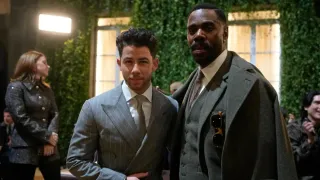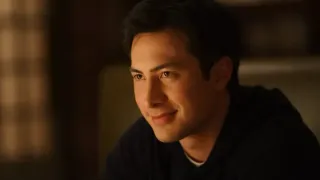April 27, 2021
Festive Films from Afar: OUTshine Film Festival Highlights
Brian Bromberger READ TIME: 9 MIN.
OUTshine Film Festival is South Florida's premiere showcase for LGBTQ+ films producing a large scale festival in Miami (April) and Fort Lauderdale (October). The 23rd edition of OUTshine - Miami will take place from April 22 - May 2, 2021.
"OUTshine is committed to its mission: To inspire, entertain and educate the public, encourage a sense of community through international and culturally diverse film, video and other media that offer historical and contemporary perspectives on the gay, lesbian, bisexual and transgender experience."
The festival has grown from a three-day event in which 25 films were presented to the current format of 10 days with 65+ films. There is special emphasis on highlighting and premiering the best GLBT Spanish language films. As with almost all film festivals, OUTshine is virtual except the closing night which will include an outdoor screening event at the Miami Beach Botanical Garden.
Can You Bring It–Bill T. Jones and D-Man in the Water is an occasionally absorbing documentary of how Jones and Arnie Zane, choreographers and personal/professional partners, formed their own post-modern dance company in the 1980s as they both struggled with AIDS. Zane died of the disease in 1988 but Jones, though HIV+ survived, and created what many critics consider his masterwork, D-Man in the Water. In 1989 it was performed as a tribute to Zane and as a celebration of company dancer Demian Acquavella's (the D-Man himself) determination to fight his illness before his death later that year.
But the real focus of the film is D-Man's 2016 revival by college student dancers at Loyola Marymount University in L.A. as they are forced to ask what is their AIDS now to inspire them to surmount the physical and emotional challenges of learning and performing this lyrical but athletically demanding work. D-Man in 1989 was widely seen as a joyous celebration of survival with Jones ultimately deciding to continue the company without Zane and become its sole choreographer.
There are interviews with original company members who performed the dance and with Jones himself. It's obvious Zane's loss is still agonizing for him, as he's not very forthcoming in his reminisces about Zane. In fact their relationship is only a small section in the documentary to its detriment as we crave to know more about Zane and how they worked together, with scant biographical details provided. The Loyola students are fine but their stories pale in comparison to both the Jones/Zane love affair and the emotional power of original member's memories. A noble effort but weakened by its timidity to confront what remains a painful past.
Beyto is a winning entry from Switzerland. Beyto is a champion swimmer and model son of Turkish emigres, who run a kebab restaurant serving as the community hub for the Turkish citizens there. Beyto is covertly in love with his coach Mike and as the relationship progresses, becomes public knowledge. A family friend discovers their secret and discloses it to Beyto's parents. They hatch a Machiavellian scheme to lure Beyto back to his provincial Turkish hometown and trick him into marrying his childhood girlfriend Seher.
The film accurately portrays the role of stigma and shame in enforcing status quo mores yet manages to show some respect for traditional values while simultaneously challenging their conventionality. An astonishing conclusion dealing with an enforced three-way relationship manages to balance all these competing convictions. Well-acted with sensitive portrayals of all the principal players from a country caught in the crossfire between liberal European ethics promoting honest living and conservative Muslim taboos.
Saint-Narcisse isn't for the faint of heart or those who love Hollywood-style predictable packaged plots. It's written and directed by the inimitable Canadian filmmaker Bruce La Bruce. He always delights in pushing the envelope to its explicit boundaries as the king of queer avant-garde exploring sexual taboos, such as his Gerontophilia (2013) about a white 18-year-old college student who falls in love with a black incapacitated 85-year-old nursing home resident.
In Saint-Narcisse, he's poking fun at the Narcissus myth through Dominic (a gorgeous Felix-Antoine Duval, but no Laurence Olivier) who fetishizes himself, masturbating to Polaroid selfies. It's Quebec 1972, and told his once-presumed dead mother may still be alive, he travels to find her, discovering she may be a witch living in a remote cabin in the woods with a very much younger woman rumored to never age.
While he sorts out this mystery, he discovers a monk in a nearby monastery who may or may not be his twin and is kept under the spell of a nefarious priest obsessed with the idea the twin might be a reincarnation of St. Sebastian. The actual story has potholes the size of boulders, but La Bruce is always more intent on inviting you into his shocking world and undermining your expectations of where he wants to take you. By no means for every taste, but in its own depraved unpredictable hippie chic style, the film takes you on an exhilarating by the seat without your pants ride.
Sublet, the latest from the great gay Israeli director Eytan Fox (Yossi and Jagger; Bubbles, Cupcakes) may well be his masterpiece and my favorite film of OUTshine. In a rare lead role, gay stage character actor John Benjamin Hickey (Love, Valour, and Compassion; The Normal Heart) scores a career-defining triumph as Michael, a New York Times intrepid travel writer, visiting Tel Aviv on a five day jaunt to discover the cool spots and vibrant street life of the city.
He sublets an apartment in a hip neighborhood from film school student Tomer (a wonderful newcomer Niv Nissum) who will eventually act as his tour guide. The reticent Michael, through Skype calls, is debating whether to pursue a surrogacy so he and his husband David can become parents. Tomer is a sexual free spirit and ridicules the idea of Michael's monogamy.
It seems the film will develop into a May/October romance, but it's really a touchingly realized tale of intergenerational mentoring, of what both men can teach each other. While recognizing it will appeal more to older gay men, it has wisdom to impart about fear and emotional intimacy that is universal. I absolutely adored this movie and one would be insane to miss watching this sublime love gift to the LGBTQ community.
My First Summer on first glance seems like it will be a whimsical bucolic Australian teen lesbian summer coming of age story, but that couldn't be further from the truth. 16-year-old Claudia's (Markela Kavenagh) mentally ill mother has drowned (a weird homage to Virginia Woolf) under suspicious circumstances witnessed by teen pariah Grace (Maiah Stewardson). The police are investigating and Grace visits Claudia at her remote isolated property, starting a friendship which develops into something deeper. There's a sweet non-threatening chemistry between the two leads.
Despite the dark subject matter, the film exudes a certain ethereal warmth particularly in the latter half, a minor accomplishment since both characters seem quite depressed, such that video clips of the film might be usable in a pharmaceutical ad for Prozac. Yet the characters do establish a tender emotional connection as they attempt to bolster each other through grief and rejection. The film is no poster child for Australian parenting skills. Teenagers will probably appreciate it more than adults with an 80 minute running time a definite plus.
Narcissus and Goldmund is the most conventional Hollywood-type movie in the festival, a fictional historical epic (i.e. Becket, The Lion in Winter) popular during the 1960s, but this one is Germanic. It's based on the famous novel by Herman Hesse that was long thought unfilmable because most of the action is the interior spiritual wrestling of Narcissus to attain perfection as an ascetic monk.
However, the director made the fortuitous decision to center the film more on Goldmund, the rogue wood-carving artist's creative and erotic exploits with a sundry women and his search for his long-lost mother. The two meet as school best friends after Goldmund's father abandons him there as atonement for his mother's whorish activities.
Goldmund defends Narcissus against bullies. Narcissus is really in love with Goldmund and based on the abbot's advice, encourages the adolescent Goldmund to leave both because he's not meant to be a monk and secondly so he won't be a source of temptation interfering with Narcissus' vocation.
Fifteen years later a wounded Goldmund will return as a respected craftsman and be commissioned by Narcissus, now abbot, to build an altar for the monastery. The cinematography of the medieval setting is breathtaking.
This is primarily a tale of unrequited gay love and enduring friendship among opposite personalities. Both actors are superb (with Jannis Niewohner's Goldmund a hottie) and create a believable sensual frisson even though it isn't consummated.
Mostly absorbing for a two-hour feature, though it sags a little in the middle but ultimately the film is insightful about the interdependent relationship between carnal and spiritual struggles to understand our identities as mortal beings.
A Good Man, one of the few trans films at OUTshine, is a major disappointment. First, it casts a cis woman (Noemie Merlant, incandescent in Portrait of A Lady On Fire) as the trans man Benjamin. Secondly, and perhaps more fatally, the script has major inconsistencies. The film charts the six-year relationship of Aude, a former ballerina, and formerly Sarah, now Benjamin, a nurse, who is currently undergoing sex reassignment surgery.
Aude cannot bear children, so Benjamin decides to stop hormonal treatments, get pregnant, and carry their baby. Benjamin claims to have finally accepted who he is, yet his mood swings suggest otherwise. The couple have moved to a remote village on Groix island in Brittany to start their lives anew after Benjamin was attacked in their previous home in Aix. But the stumbling issue is that mid-way into the film, Aude having already sacrificed her dancing career, feeling invisible, and still frustrated she can't have a child, leaves Benjamin.
Thus, the linchpin relationship and the raison d' etre for the pregnancy collapses. The film never regains its momentum. Also, family members and friends once supportive of Benjamin are horrified by his decision to get pregnant. They disappear and later emerge unexpectedly as being more understanding, but the audience isn't privy to how and why their attitudes changed. Finally, the ending is both predictable and in line with this last criticism, oddly unfulfilling.
The film's only virtue is to serve as a conversation starter about gender roles and who should or shouldn't be bearing children, an issue only bound to get more volatile as reproductive technology continues to make scientific strides.
I Am Syd Stone is a winning six-episode TV series from Canada about a former A-list hearthrob Hollywood star (Travis Nelson) fallen on hard times and is shooting a B movie in a small town. Closeted with a girl friend and self-destructive to boot, he gets drunk one night in the hotel bar where he meets Matt (Benjamin Charles Watson), a lawyer in town for a huge court case.
A passionate affair ensues that eventually attracts public attention, with Syd having to decide whether or not to come out as gay even though it could end his career. What could have been a clichéd routine exercise instead divulges an unexpected emotional depth mainly due to Travis Nelson's poignant intuitive performance and believable rapport with Watson. An eye-opening delight and well worth seeking out.
The Extinction of Fireflies should have remained on stage instead of being filmed as a play. Set on Labor Day weekend at a New England seaside home of James (Drew Droege) a gay playwright, he has invited a fading TV actress friend Charlotte (Tracie Bennett) and insipid young actor Jay (Michael Urie) to read through his new play about the relationship of the Roman Emperor Hadrian and his stunning adolescent lover Antoninus, called The Extinction of Fireflies. Jay has brought along his hunky boyfriend Callisto which ignites sparks.
The film feels stagy from the very beginning. While there are some clever catty one-liners, the gay characters are poorly developed. Bennett, an English stage actress, is luminous while channeling Tallulah Bankhead as the alcoholic, chain-smoking diva who performs now only for the social media crowd. We love Michael Urie (from his Ugly Betty TV days), but he has nothing to work with here and it is never explained why Callisto is such a shambles.
Worth seeing only for Bennett, though kudos to the cast since filmed during the pandemic, they sheltered in place together, but sadly there is little to show for their heroic efforts.
Romanian cinema is undergoing a renaissance (i.e. Four Months, Three Weeks, and Two Days) but has had few LGBTQ representatives, probably because this is a country largely hostile to queer people. So Poppy Field, an examination of a closeted policeman in Bucharest, is a welcome addition to the festival. The film opens with Cristi reuniting with his visiting French boyfriend Hadi in lust-filled joy, but complicated by the surprise appearance of Cristi's borderline accepting sister and Hadi's wish to take an overnight trip to the mountains to be alone together, rejected by the overly cautious Cristi.
Cristi goes to work and is called to intervene at a movie theater where a religious ultra-nationalist homophobic group is preventing the showing of a queer film, apparently based on a real life event. Cristi recognizes one of the protesters as a former lover, confronts him, and when he threatens to expose him, Cristi beats him physically. Cristi is segregated as the police begin an investigation, with the possibility the incident could end his career.
The film is adept in showing the devastating impact of the closet both romantically and professionally. The tension, as his fellow officers decide Cristi's fate and whether they believe the gay allegations against him, is skillfully and heartbreakingly executed.
The only flaw is that the film at 80 minutes doesn't return to resolving his differences with Hadi, but as an effective marriage between a personal crisis drama and a police procedural, Poppy Field starkly spotlights the landmines of a conservative country wrestling inconclusively with homosexuality to the disservice of all concerned. It's not great, but a promising start for director Eugen Jebeleanu.
https://www.outshinefilm.com/
Help keep the Bay Area Reporter going in these tough times. To support local, independent, LGBTQ journalism, consider becoming a BAR member.






